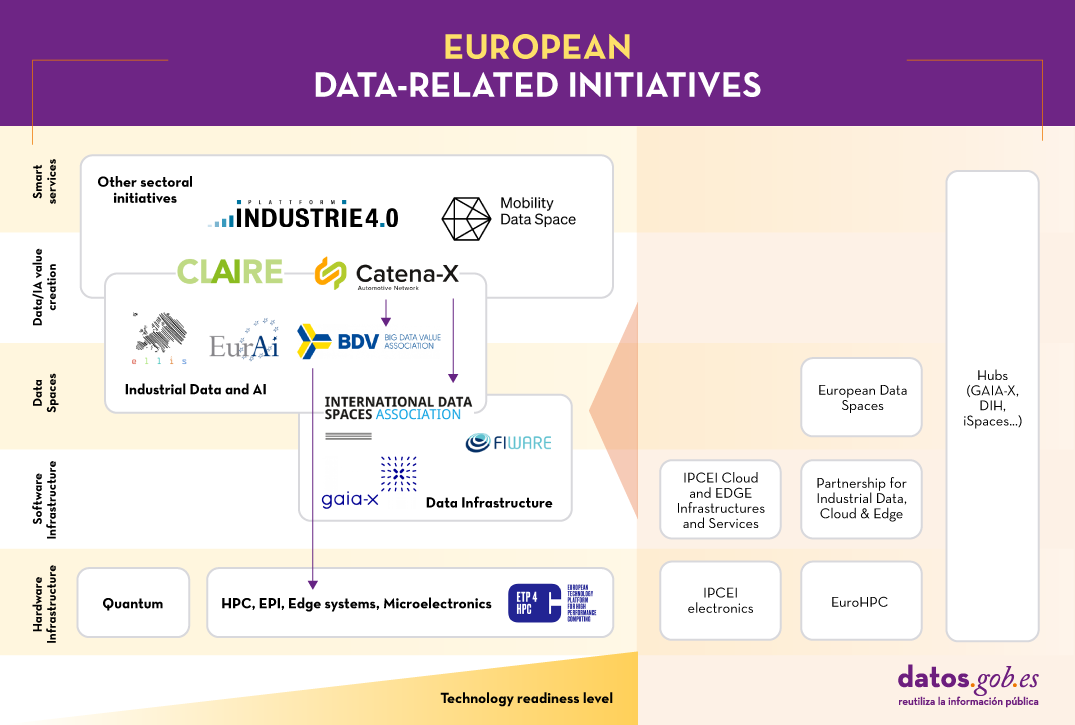
There is no doubt that data is a fundamental asset for companies. Properly processed, they generate great competitive advantages, both in decision-making and in the generation of new products and services, enabling technologies such as Artificial Intelligence. This situation has made many organisations wary of sharing their data. However, the situation is changing and more and more companies and organisations are becoming aware of the advantages of this practice.
Data sharing drives efficiency in supply chains, enabling faster and more innovative product development. By sharing their data, organisations also benefit from access to third-party data, which can be of great use in a variety of fields: from training machine learning systems to enriching internal analytics. In addition, the fact that several companies are working in the same field, generating advances, means that the market matures earlier, opening up new business opportunities, as well as reducing the time and costs of marketing products. There are also benefits in terms of transparency and reputation.
Secure and controlled environments, such as data spaces, are necessary for this data exchange to take place in a safe and secure manner.
What are data spaces?
A data space is an ecosystem where diverse actors share data in a voluntary and secure manner, following common governance, organisational, regulatory and technical mechanisms. Some of the characteristics of advanced data spaces include:
- They ensure participants' trust and sovereignty over their data, creating an ecosystem of peer-to-peer data sharing. In a data space, each participant retains control over its own data, indicating the terms and conditions under which it can be used.
- They are independent of the underlying technological solution. This allows for portability and deployment in different physical infrastructures.
- Data is shared under FAIR principles, which facilitates the location, access and use of the data. To this end, datasets must be properly described, including the taxonomies used and their restrictions on use.
- They enable the deployment of different roles, such as data producers, consumers, data service providers, component developers or operators of essential services, facilitating the development of data intermediaries.
- They ensure the identity of the participants, as well as the suitability of the software components used, by means of appropriate approval or certification mechanisms.
- They enable different policies of access and use of information, so that data subjects can determine whether data is shared for free or not, under mechanisms that guarantee its proportionality.
- They ensure interoperability
European data spaces key to boosting the data economy
Data spaces are a key element of the European Data Strategy, which, among other issues, seeks to boost the region's economy through the creation of a single European data market, where data flows between Member States and between sectors of activity, in accordance with the European values of self-determination, privacy, transparency, security and fair competition.
In this strategy, the European Commission has already announced its interest in investing in and developing common data spaces in strategic economic sectors and sectors of public interest, notably those related to manufacturing, sustainable energy, mobility, health, finance, energy, agriculture, public administrations and skills. Once developed, these spaces are expected to be interconnected, so that the data available in them can be cross-exploited.
The creation of these data spaces seeks to overcome the legal and technical barriers linked to data sharing, through common standards, tools and infrastructures in a context of digital sovereignty. According to the European data strategy, the development of European data spaces should be carried out taking into account the following elements:
- The deployment of tools and services for data processing, exchange and sharing, as well as the federation of secure and energy-efficient cloud capabilities and related services. These tools should enable access to data in a fair, transparent, proportionate and non- discriminatory manner.
- The development of clear and reliable data governance structures, in compliance with EU law, with particular attention to the protection of personal data, consumer and competition law.
- Improving the availability, quality and interoperability of data, both within specific domains and across sectors.
In this regard, the European Commission endorses various measures and initiatives for the development of secure and sustainable digital infrastructures. These include Gaia-X, which seeks the development of an open, federated and interoperable data infrastructure in the cloud, and the International Data Spaces Association (IDSA), probably a substantial part of Gaia-X, which promotes an architectural reference model for the development of data spaces.
In the image below you can see these and other European initiatives at different levels related to data spaces. The left and central part shows some of the main European data initiatives, and how these are supported by hardware infrastructures. The right hand side shows the alignment with the most important EU initiatives within the European Data Strategy.

Spain is aligned with Europe in this area: the transition to a data economy is among the axes of the Digital Spain 2025 Plan. Work is currently underway to promote the enabling environment for the creation of sectoral data spaces, through the various data initiatives included in the Recovery, Transformation and Resilience Plan. One example is the Spanish Gaia-X Hub, aimed at deploying a robust ecosystem in the field of industrial data sharing, comprising companies of all sizes. The aim of this type of action is to create a community around data that favours innovation and economic growth, with the consequent benefit for society.
Content written by the datos.gob.es team
Yo me pregunto porque no cogéis el IV PLAN DE GOBIERNO ABIERTO DE ESPAÑA e implementamos el espacio de datos abiertos públicos bajo el modelo GAiAX ? porque no predicar con el ejemplo?
Muchas gracias por su comentario,
Los datos abiertos serán parte fundamental de todo espacio de datos sectorial, y su suministro deberá realizarse en consonancia con los principios enunciados en el artículo. Cuando la infraestructura propuesta por Gaia-X esté lo suficientemente madura, sin duda, ese será el medio por el cual se harán disponibles.
Un cordial saludo.